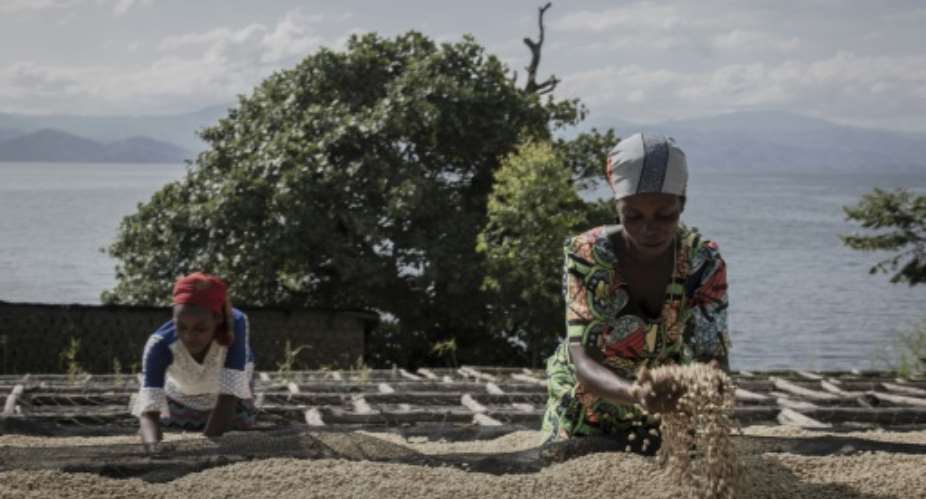The afternoon sun beats down on Lake Kivu in eastern Democratic Republic of Congo, where on an island, row after row of coffee bushes are bringing forth a rich harvest of berries.
And the main beneficiaries will be women -- the outcome of an equity project in a sector where women are notoriously sidelined and under-paid.
"Women are the ones who work the land, but when it comes to harvesting (the crop) and marketing (it), they get pushed aside -- it becomes a man's business," said Marcelline Budza, a 33-year-old feminist and entrepreneur.
"That was what disgusted me."
 Marcelline Budza, founder of Rebuild Women's Hope. By Guerchom NDEBO (AFP)
Marcelline Budza, founder of Rebuild Women's Hope. By Guerchom NDEBO (AFP)
Nine years ago, Budza founded an NGO called Rebuild Women's Hope (RWH) to expand the role of women in the Democratic Republic of Congo's coffee sector.
RWH set its eyes on Idjwi, an island of some 300 square kilometres (115 square miles) located in the middle of Lake Kivu, where some of the world's most-lauded coffee is grown.
Arabica coffee from Idjwi has a worldwide reputation -- a richness that comes from being grown at high altitude, in dark volcanic soil and without chemical fertilisers.
 Idjwi lies in the heart of one of Africa's Great Lakes. By Sophie RAMIS (AFP)
Idjwi lies in the heart of one of Africa's Great Lakes. By Sophie RAMIS (AFP)
"It's exceptional," said Daniel Abamungu Cinyabuguma, manager of the Muungano agricultural cooperative in Goma, on the shore of the great lake.
The berries are picked, washed and sorted before being allowed to ferment and then dry -- labour-intensive work that in the DRC has long been dominated by men.
"Men denigrate the women, saying that coffee growing isn't for them," Budza said.
Overcoming prejudice -- not to mention red tape, tax demands, fraud and lack of credit -- has taken years of effort, which are now being rewarded, she said.
 Thousands of women are hired to sort out the coffee berries, removing unwanted fruits and dirt. By Guerchom NDEBO (AFP)
Thousands of women are hired to sort out the coffee berries, removing unwanted fruits and dirt. By Guerchom NDEBO (AFP)
Today, RWH employs at least 12,000 women at the peak of the coffee-harvesting season.
The women chiefly work in processing the coffee and in office administration, and are paid at the same rate as the nearly 900 men.
"My goals are being achieved," said Budza. "Women can now smile, they can be financially independent."
Rosette Nyakalala Bisengi, a 24-year-old cultivator and coffee sorter confirmed things had improved.
But she still earns only 2,500 Congolese francs ($1.25) a day and would like to double that.
Even so, she said, "I have enough money to buy a goat, a chicken... I send my children to school, I buy them clothes."
RWH produces between six and 10 containers of coffee per harvest, each holding 19 tonnes of coffee. The coffee comes from its own fields, but also from a number of small producers.
"Our coffee is consumed in the United States, Europe and Asia. We have really good results," said Budza.
"We hope to expand and reach 20 containers (per harvest), using only local labour."





 We’ll no longer tolerate your empty, unwarranted attacks – TUC blasts Prof Adei
We’ll no longer tolerate your empty, unwarranted attacks – TUC blasts Prof Adei
 Bawumia donates GHc200,000 to support Madina fire victims
Bawumia donates GHc200,000 to support Madina fire victims
 IMF to disburse US$360million third tranche to Ghana without creditors MoU
IMF to disburse US$360million third tranche to Ghana without creditors MoU
 Truck owner share insights into train collision incident
Truck owner share insights into train collision incident
 Paramount chief of Bassare Traditional Area passes on
Paramount chief of Bassare Traditional Area passes on
 Two teachers in court over alleged illegal possession of BECE papers
Two teachers in court over alleged illegal possession of BECE papers
 Sunyani: Victim allegedly shot by traditional warriors appeals for justice
Sunyani: Victim allegedly shot by traditional warriors appeals for justice
 Mahama vows to scrap teacher licensure exams, review Free SHS policy
Mahama vows to scrap teacher licensure exams, review Free SHS policy
 Government will replace burnt Madina shops with a new three-story, 120-store fac...
Government will replace burnt Madina shops with a new three-story, 120-store fac...
